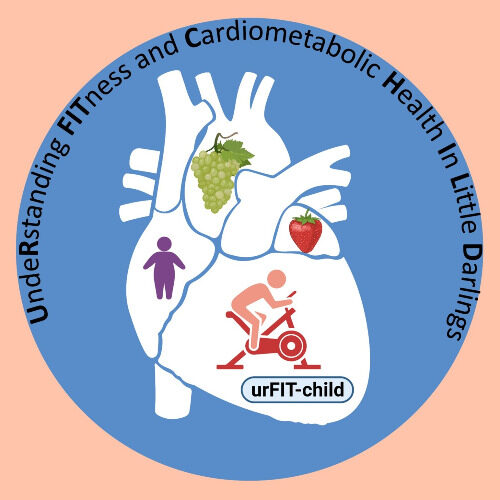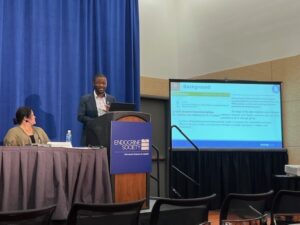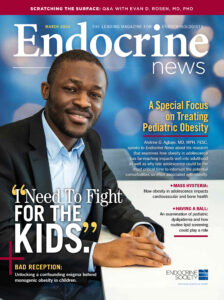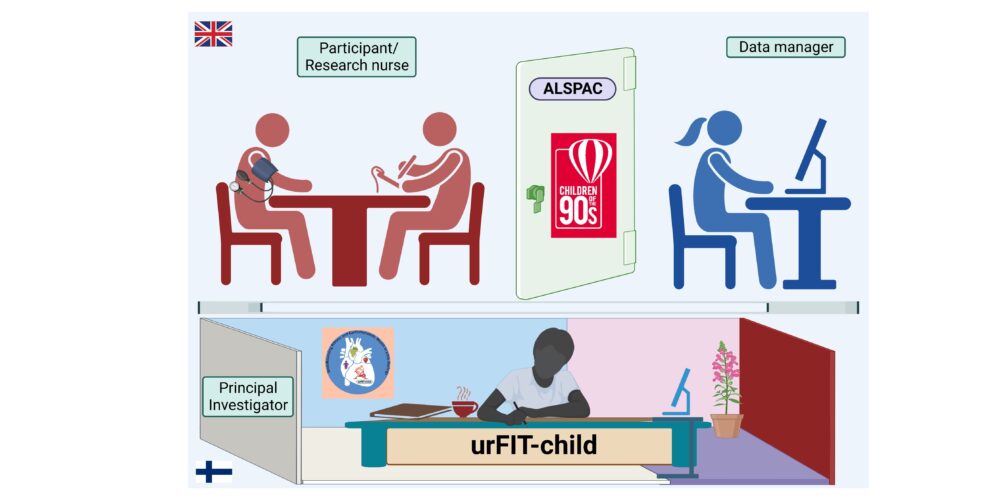
UndeRstanding FITness and Cardiometabolic Health In Little Darlings (urFIT-child)
Leaders
UndeRstanding FITness and Cardiometabolic Health In Little Darlings (urFIT-child) is a multi-disciplinary and multi-collaborative research group in cooperation with renowned global experts across several continents, viz; Oceania, North America, Africa, Europe, and Asia.
The major study outcomes are: arterial stiffness (carotid-femoral pulse wave velocity), carotid intima-media thickness, carotid elasticity or distensibility, left ventricular concentric and eccentric hypertrophy, left ventricular diastolic function, left ventricular filling pressure, etc. These cardiac and vascular outcomes were measured both in adolescence (age 17 years) and young adulthood (age 24 years). Modifiable risk factors are total cholesterol, triglyceride, low-density lipoprotein cholesterol, high-density lipoprotein cholesterol, insulin resistance (glucose and insulin), blood pressure, heart rate, low-grade inflammation, obesity, body composition (fat mass and muscle mass), sedentary time, light physical activity, moderate-to-vigorous physical activity, smoking habit, cardiorespiratory fitness. Risk factors where measured during clinic visit from childhood starting at age 7 years and repeated either yearly or bi-annually until age 17 years. Young adulthood assessments occurred at age 24 years clinic visit, the 30-year clinic visit is currently ongoing (2022 – 2024).
Data and Population Size:
Data for urFIT-child research project are drawn from the Avon Longitudinal Study of Parents and Children (ALSPAC), also known as Children of the 90s, a world-leading UK ongoing birth cohort study. More than 14,000 pregnant women were recruited from April 1991 through December 1992 and 14,901 foetuses arising from the pregnancy, and their partners have been followed up intensively over three decades. The ALSPAC study website contains details of all the data that are available (http://www.bristol.ac.uk/alspac/researchers/our-data/).
News
-
 How to reverse the damage your kid’s sedentary time has done to their heart
How to reverse the damage your kid’s sedentary time has done to their heartHow to reverse the damage your kid’s sedentary time has done to their heart
The time kids spend being sedentary may be correlated with an increase in the mass of the heart’s left ventricle — particularly in girls,… -
 Physical Activity: Slow And Steady Wins The Race
Physical Activity: Slow And Steady Wins The RacePhysical Activity: Slow And Steady Wins The Race
Not only do our findings challenge conventional beliefs, the editors of journals seem to also be uncomfortable with our results.” Dr. Andrew Agbaje… -
 Stiff Arteries May Cause Metabolic Syndrome
Stiff Arteries May Cause Metabolic SyndromeStiff Arteries May Cause Metabolic Syndrome
It seems metabolic syndrome has a new risk factor we haven't thought about. New research published in the American Journal of Physiology found that… -
 Get the Benefits of Exercise Without Breaking a Sweat
Get the Benefits of Exercise Without Breaking a SweatGet the Benefits of Exercise Without Breaking a Sweat
For as long as we’ve had official recommendations for exercise, those recommendations have focused on effort. Do at least 150 minutes a week of…
Cooperation
-
Prof. Alan R. Barker, PhD
Associate Professor in Paediatric Physiology and Health, Children's Health and Exercise Research Centre, University of Exeter, UK
-
Dr. Gary F. Mitchell, MD
Cardiovascular Engineering Inc. Norwood, MA 02062, United States
-
Prof. Justin Zacharias, MD, MPH
Associate Professor in Pediatric Cardiology, Department of Pediatrics, Texas Children's Hospital, Baylor College of Medicine, Houston, Texas, US
-
Prof. Tracy Baynard, PhD
Professor, Department of Exercise and Health Sciences, Manning College of Nursing & Health Sciences, University of Massachusetts, Boston, US
-
Prof. Augustine Odili, MD, PhD
Professor of Preventive Cardiology, Department of Epidemiology, Circulatory Health Research Laboratory, College of Health Sciences, University of Abuja, Nigeria.
-
Prof. Donald M. Llyod-Jones, MD, ScM
President of the American Heart Association 2021-2022, Professor of Preventive Medicine (Epidemiology), Medicine (Cardiology) and Pediatrics. Northwestern University Feinberg School of Medicine, Chicago, IL, USA.
-
Prof. David S. Ludwig, MD, PhD
Professor of Pediatrics and Professor of Nutrition, New Balance Foundation Obesity Prevention Center, Boston Children's Hospital, Boston, MA, USA; Department of Pediatrics, Harvard Medical School, Boston, MA, USA; Department of Nutrition, Harvard TH Chan School of Public Health, Boston, MA, USA
-
Prof. Costan Magnussen, PhD
Associate Professor in Cardiovascular Epidemiology, The Baker Heart and Diabetes Institute, Australia; Research Centre of Applied and Preventive Cardiovascular Medicine, University of Turku, Turku, Finland; Centre for Population Health Research, Turku University Hospital, University of Turku, Turku, Finland.
-
International Youth Vascular Consortium (YVC) (Dr. Rachel Clime PhD)
Menzies Institute for Medical Research-University of Tasmania, Tasmania, Australia
-
Prof. Paul Leeson MD, PhD
Professor of Cardiovascular Medicine, Head of Oxford Cardiovascular Clinical Research Facility, Consultant Physician, University of Oxford, UK
-
Prof. Adam Lewandowski DPhil, FESC
Associate Professor of Cardiovascular Science, British Heart Foundation Intermediate Research Fellow, Deputy Director of the Oxford Cardiovascular Clinical Research Facility, Oxford University, UK
-
Prof. Wei Perng, PhD MPH
Associate Professor of Epidemiology, Colorado School of Public Health Associate Director of Research Training & Education, Lifecourse Epidemiology of Adiposity & Diabetes (LEAD) Center, Denver, Colorado, US
-
Prof. Mélanie Henderson, MD, FRCPC, PhD
Head, Research Axis ‐ Metabolic and Cardiovascular Health, CHU Sainte‐Justine Pediatric Endocrinologist, CHU Sainte‐Justine Clinical Associate Professor, Department of Pediatrics, Faculty of Medicine, Université de Montréal; Clinical Associate Professor ‐ Secondary Affiliation, Médecine sociale et préventive, Université de Montréal; Adjunct Professor, Epidemiology, Biostatistics & Occupational Health, McGill University
-
Prof. Dr. Renate Oberhoffer-Fritz
Professor of Pediatric Cardiology, Chair of Pediatric Prevention, Dean Faculty of Sport and Health Sciences, Technical University Munich, Germany
-
Dr. Dimitris Vlachopoulos, PhD, FHEA
Senior Lecturer, Pediatric Exercise and Health, Children's Health and Exercise Research Centre - Public Health and Sports Sciences department Faculty of Health and Life Sciences - University of Exeter Medical School, Exeter, UK
-
Professor Craig Williams
Director of the Children's Health & Exercise Research Centre (CHERC), Professor of Paediatric Physiology and Health, Public Health and Sports Sciences, University of Exeter Medical School Faculty of Life and Health Sciences, St. Luke's Campus, University of Exeter, UK
-
Dr. med. Christoph Saner, MD, PhD
Pediatric Endocrinologist and Senior Physician, Department of Pediatrics, Inselspital, Bern University Hospital, University of Bern, Bern, Switzerland and Honorary Research Fellow Murdoch Children`s Research Institute Parkville, Australia
-
The urFIT-child project research proposals are listed below but not limited to:
Cardiorespiratory fitness, adiposity and lean mass in relation to arterial structure and function from childhood to adulthood
https://proposals.epi.bristol.ac.uk/?q=node/130051
Associations between sedentary time and physical activity with arterial function and structure from childhood to adulthood
https://proposals.epi.bristol.ac.uk/?q=node/130208
Associations of cardiorespiratory fitness, body composition, physical activity and sedentary time with cardiometabolic risks
https://proposals.epi.bristol.ac.uk/?q=node/130309
Youth Vascular Consortium
https://proposals.epi.bristol.ac.uk/?q=node/130322
Association of inflammation with cardiac structure in adolescents
https://proposals.epi.bristol.ac.uk/?q=node/130952
-
Agbaje AO. Accelerometer-based sedentary time and physical activity with MASLD and liver cirrhosis in 2684 British adolescents. npj Gut & Liver 2024 Jun 1;1. https://doi.org/10.1038/s44355-024-00002-y
Agbaje AO. Accelerometer-based sedentary time and physical activity from childhood through young adulthood with progressive cardiac changes: a 13-year longitudinal study. Eur J Prev Cardiol. 2024 May 7:zwae129. https://doi.org/10.1093/eurjpc/zwae129 Epub ahead of print. PMID: 38711312.
Agbaje AO. Author reply to correspondence from Hudda et al. on waist-circumference-to-height-ratio had better longitudinal agreement with DEXA-measured fat mass than BMI in 7237 children. Pediatr Res. 2024 Jun 12. https://doi.org/10.1038/s41390-024-03316-y. Epub ahead of print. PMID: 38867028.
A O Agbaje, Increased low-density lipoprotein cholesterol predict the risk of progressive structural but not functional cardiac damage in youth: a 7-year follow-up study. Eur J Prev Cardiol. 2024 Jun 1;31,Issue Supplement_1: zwae175.366, https://doi.org/10.1093/eurjpc/zwae175.366
A O Agbaje, No association between increased high-density lipoprotein cholesterol and progressive cardiac damage in 1595 adolescents: a 7-year longitudinal study. Eur J Prev Cardiol. 2024 Jun 1;31, Issue Supplement_1:zwae175.365, https://doi.org/10.1093/eurjpc/zwae175.365
Zachariah JP, Jone PN, Agbaje AO, Ryan HH, Trasande L, Perng W, Farzan SF; American Heart Association Council on Lifelong Congenital Heart Disease and Heart Health in the Young; Council on Cardiovascular and Stroke Nursing; Council on Epidemiology and Prevention; Council on Lifestyle and Cardiometabolic Health; and Council on Clinical Cardiology. Environmental Exposures and Pediatric Cardiology: A Scientific Statement From the American Heart Association. Circulation. 2024 Apr 15. doi: 10.1161/CIR.0000000000001234. Epub ahead of print. PMID: 38618723.
Agbaje AO, Barker AR, Lewandowski AJ, Leeson P, Tuomainen TP. Accelerometer-based sedentary time, light physical activity, and moderate-to-vigorous physical activity from childhood with arterial stiffness and carotid IMT progression: A 13-year longitudinal study of 1339 children. Acta Physiol (Oxf). 2024;240(5):e14132. https://doi.org/10.1111/apha.14132
Agbaje AO. The Interactive Effects of Sedentary Time, Physical Activity, and Fat Mass on Insulin Resistance in the Young Population. J Clin Endocrinol Metab. 2024 Mar 5:dgae135. https://doi.org/10.1210/clinem/dgae135. Epub ahead of print. PMID: 38441224.
Agbaje AO. Waist-circumference-to-height-ratio had better longitudinal agreement with DEXA-measured fat mass than BMI in 7237 children. Pediatr Res. 2024 Mar 5. Epub ahead of print. https://doi.org/10.1038/s41390-024-03112-8. PMID: 38443520.
Agbaje AO. Mediating effect of fat mass, lean mass, blood pressure and insulin resistance on the associations of accelerometer-based sedentary time and physical activity with arterial stiffness, carotid IMT and carotid elasticity in 1574 adolescents. J Hum Hypertens. 2024 Feb 26. https://doi.org/10.1038/s41371-024-00905-6
Agbaje AO, Saner C, Zhang J, Henderson M, Tuomainen TP. DEXA-based Fat Mass with the Risk of Worsening Insulin Resistance in Adolescents: A 9-Year Temporal and Mediation Study. J Clin Endocrinol Metab. 2024 Jan 4:dgae004. https://doi.org/10.1210/clinem/dgae004 Epub ahead of print. PMID: 38173399.
Agbaje AO. Increasing lipids with risk of worsening cardiac damage in 1595 adolescents: A 7-year longitudinal and mediation study. Atherosclerosis. 2024 Feb 1:389;117440. https://doi.org/10.1016/j.atherosclerosis.2023.117440
-
Agbaje AO, Perng W, Tuomainen TP. Effects of accelerometer-based sedentary time and physical activity on DEXA-measured fat mass in 6059 children. Nature Communications. 2023 Dec 12;14(1):8232. https://doi.org/10.1038/s41467-023-43316-w
Agbaje AO. Associations of Sedentary Time and Physical Activity From Childhood With Lipids: A 13-Year Mediation and Temporal Study. J Clin Endocrinol Metab. 2023 Dec 14:dgad688. https://doi.org/10.1210/clinem/dgad688 Epub ahead of print. PMID: 38097375.
A O Agbaje, A R Barker, A J Lewandowski, P Leeson, T P Tuomainen. Cumulative accelerometer-based sedentary time from childhood through young adulthood with increased arterial stiffness and carotid intima-media thickness in youth: a 13-year longitudinal study. European Heart Journal 2023 Nov 2;44(Supplement_2):ehad655.2077. https://doi.org/10.1093/eurheartj/ehad655.2077
A O Agbaje, A R Barker, A J Lewandowski, P Leeson, T P Tomi-Pekka. Cumulative accelerometer-based light physical activity from childhood through young adulthood with arterial stiffness and carotid intima-media thickness progression: a 13-year longitudinal study. European Heart Journal 2023 Nov 2;44(Supplement_2):ehad655.2338. https://doi.org/10.1093/eurheartj/ehad655.2338
A O Agbaje. Cumulative accelerometer-based sedentary time from childhood through young adulthood with progressive left ventricular remodelling in British youth: a 13-year longitudinal study. European Heart Journal 2023 Nov 2;44(Supplement_2):ehad655.2393. https://doi.org/10.1093/eurheartj/ehad655.2393
A O Agbaje. Prospective associations of non-HDL cholesterol with premature structural and functional cardiac damage progression in British youth: the ALSPAC study. European Heart Journal 2023 Nov 2;44(Supplement_2):ehad655.3017. https://doi.org/10.1093/eurheartj/ehad655.3017
A O Agbaje. Cumulative accelerometer-based light physical activity from childhood through young adulthood progressively decreases left ventricular mass in British youth: a 13-year longitudinal study. European Heart Journal 2023 Nov 2;44(Supplement_2):ehad655.1139. https://doi.org/10.1093/eurheartj/ehad655.1139
A O Agbaje. Increased triglyceride independently associates with premature structural and functional cardiac damage progression in asymptomatic adolescents: a 7-year longitudinal study. European Heart Journal 2023 Nov 2;44(Supplement_2):ehad655.2502. https://doi.org/10.1093/eurheartj/ehad655.2502
A O Agbaje. A 7-year longitudinal association of total cholesterol with premature structural and functional cardiac damage progression in youth: the ALSPAC birth cohort study. European Heart Journal 2023 Nov 2;44(Supplement_2):ehad655.1138. https://doi.org/10.1093/eurheartj/ehad655.1138
A O Agbaje. An average of 60mins/day of moderate to vigorous physical activity from childhood through young adulthood was associated with worsening cardiac structural damage in youth: A 13-year longitudinal study. European Heart Journal 2023 Nov 2;44(Supplement_2):ehad655.2602. https://doi.org/10.1093/eurheartj/ehad655.2602
A O Agbaje. Longitudinal Associations of Accelerometer-Based Sedentary Time and Physical Activity With Blood Pressure Progression From Childhood Through Young Adulthood: A 13-year Mediation and Isotemporal Substitution Study of 2513 Children. Circulation. 2023 Nov 6;148:A16549. https://www.ahajournals.org/doi/10.1161/circ.148.suppl_1.16549
Agbaje AO, Zachariah JP, Tuomainen TP. Arterial Stiffness but not Carotid Intima-Media Thickness Progression Precede Premature Structural and Functional Cardiac Damage in Youth: A 7-Year Temporal and Mediation Longitudinal Study. Atherosclerosis 2023 Sep;380:117197. https://doi.org/10.1016/j.atherosclerosis.2023.117197
Agbaje AO. Associations of accelerometer-based sedentary time, light physical activity and moderate-to-vigorous physical activity with resting cardiac structure and function in adolescents according to sex, fat mass, lean mass, BMI, and hypertensive status. Scand J Med Sci Sports. 2023 Aug;33(8):1399-1411. doi: 10.1111/sms.14365.
Agbaje AO. Adolescents Cholesterol Passport: A Universal Pediatric Lipid Screening Tool to Combat Atherosclerosis – the World’s Deadliest Scourge. Front Pediatr. 2023 June 19;11. doi: 10.3389/fped.2023.1228483
Agbaje AO. Longitudinal Mediating effect of Fatmass and Lipids on Sedentary Time, Light PA, and MVPA with Inflammation in Youth. J Clin Endocrinol Metab. 2023 Jun 13:dgad354. doi: 10.1210/clinem/dgad354. Epub ahead of print. PMID: 37310686.
Agbaje AO. Arterial stiffness preceding metabolic syndrome in 3,862 adolescents: a mediation and temporal causal longitudinal birth cohort study. Am J Physiol Heart Circ Physiol. 2023 Jun 1;324(6):H905-H911. doi: 10.1152/ajpheart.00126.2023.
Agbaje AO. Does arterial stiffness mediate or suppress the associations of blood pressure with cardiac structure and function in adolescents?. Am J Physiol Heart Circ Physiol. June 1 2023;324(6):H776-H781. doi: 10.1152/ajpheart.00094.2023.
Agbaje AO. Longitudinal Left Ventricular Mass Indexing for DEXA-Measured Lean Mass and Fat Mass: Novel Normative Reference Centiles in Post-Pubertal Adolescents and Young Adults. American Journal of Physiology-Heart and Circulatory Physiology 2023, Apr 1;324(4):H571-H577. https://doi.org/10.1152/ajpheart.00045.2023
Agbaje AO, Barker AR, Tuomainen TP. Cumulative muscle mass and blood pressure but not fat mass drives arterial stiffness and carotid intima-media thickness progression in the young population and is unrelated to vascular organ damage. Hypertension Research April 1 2023;46:984–999. doi: 10.1038/s41440-022-01065-1.
Agbaje AO. Elevated Blood Pressure and Worsening Cardiac Damage During Adolescence. The Journal of Pediatrics. 2023 Mar 3:S0022-3476(23)00132-4. doi: 10.1016/j.jpeds.2023.02.018.
Agbaje AO, Zachariah JP, Bamsa O, Odili AN, and Tuomainen T-P. Cumulative insulin resistance and hyperglycaemia with arterial stiffness and carotid IMT progression in 1779 adolescents: A 9-Year Longitudinal Cohort Study. American Journal of Physiology-Endocrinology and Metabolism 2023 Mar 1;324(3):E268-E278. https://doi.org/10.1152/ajpendo.00008.2023
Agbaje AO, Barmi S, Sansum KM, Baynard T, Barker AR, and Tuomainen T-P. Temporal longitudinal associations of carotid-femoral pulse wave velocity and carotid intima-media thickness with resting heart rate and inflammation in youth. Journal of Applied Physiology 2023 Mar 1;134(3):657-666. https://doi.org/10.1152/japplphysiol.00701.2022
Agbaje AO, Lloyd-Jones DM, Magnussen CG, Tuomainen T-P. Cumulative Dyslipidemia with Arterial Stiffness and Carotid IMT Progression in Asymptomatic Adolescents: A Simulated Intervention Longitudinal Study Using Temporal Inverse Allocation Model. Atherosclerosis Jan 1 2023;364:39-48. https://doi.org/10.1016/j.atherosclerosis.2022.11.011
-
Agbaje AO. Cardiorespiratory Fitness in Adolescence: A Telescope into Future Cardiovascular Health. Eur J Prev Cardiol. 2022 Dec 13:zwac298. doi: 10.1093/eurjpc/zwac298.
Andrew O Agbaje, Justin P Zachariah, and Tomi-Pekka Tuomainen. Arterial Stiffness and Carotid Intima-Media Thickness Progression Preceding Worsening Left Ventricular Hypertrophy and Diastolic Dysfunction in Youth: A Temporal Causal Longitudinal Study. Circulation 2022, Oct 30. doi/10.1161/circ.146.suppl_1.13679
Agbaje AO. To prevent hypertension in Africans: do we need to eat more vegetables? Eur J Prev Cardiol. 2022 Oct 10:zwac233. doi: 10.1093/eurjpc/zwac233.
A O Agbaje, D M Lloyd-Jones, C G Magnussen, T P Tuomainen. Cumulative dyslipidaemia from mid-adolescence through young adulthood with carotid intima-media thickness progression: a 9-year longitudinal study. European Heart Journal, 2022 Oct 2:43(Supplement_2,); ehac544.2350, https://doi.org/10.1093/eurheartj/ehac544.2350
A O Agbaje, S Barmi, K M Sansum, T Baynard, A R Barker, T P Tuomainen. Does arterial stiffness progression temporally precede higher low-grade inflammation in adolescents? Causal longitudinal evidence using auto-regressive cross-lagged structural equation models. European Heart Journal, 2022 Oct 2:43(Supplement_2,);ehac544.2247. https://doi.org/10.1093/eurheartj/ehac544.2247
A O Agbaje, D M Lloyd-Jones, C G Magnussen, T P Tuomainen. Simulated intervention and optimal timing for attenuating dyslipidaemia-related atherosclerotic progression in the young: a temporal inverse allocation analysis of the ALSPAC cohort. European Heart Journal, 2022 Oct 2:43(Supplement_2,); ehac544.2352, https://doi.org/10.1093/eurheartj/ehac544.2352
A O Agbaje, S Barmi, K M Sansum, T Baynard, A R Barker, T P Tuomainen. Temporal causal longitudinal associations of high-sensitivity C-reactive protein with carotid intima-media thickness progression in adolescents: the ALSPAC birth cohort study. European Heart Journal, 2022 Oct 2:43(Supplement_2,); ehac544.2246, https://doi.org/10.1093/eurheartj/ehac544.2246
A O Agbaje, J P Zachariah, O Bamsa, A N Odili, T P Tuomainen. Cumulative hyperinsulinemia, hyperglycaemia, and insulin resistance from mid-adolescence through young adulthood with carotid intima-media thickness progression: a 9-year longitudinal study. European Heart Journal, 2022 Oct 2:43(Supplement_2,);ehac544.2414, https://doi.org/10.1093/eurheartj/ehac544.2414
A O Agbaje, D M Lloyd-Jones, C G Magnussen, T P Tuomainen. Longitudinal associations of cumulative dyslipidaemia from mid-adolescence through young adulthood with arterial stiffness progression: the ALSPAC study. European Heart Journal, 2022 Oct 2:43(Supplement_2,);ehac544.2351, https://doi.org/10.1093/eurheartj/ehac544.2351
Agbaje AO. Mediating role of body composition and insulin resistance on the association of arterial stiffness with blood pressure among adolescents: The ALSPAC study. Front. Cardiovasc. Med. 2022: 9:939125. doi: 10.3389/fcvm.2022.939125
Agbaje AO. Arterial stiffness precedes hypertension and metabolic risks in youth: a review. J Hypertens. 2022 Oct 1;40(10):1887-1896. . doi: 10.1097/HJH.0000000000003239.
Agbaje AO, Barker AR, Mitchell GF, Tuomainen TP. Effect of Arterial Stiffness and Carotid Intima-Media Thickness Progression on the Risk of Dysglycemia, Insulin Resistance, and Dyslipidemia: a Temporal Causal Longitudinal Study. Hypertension. 2022 Mar;79(3):667-678. doi: 10.1161/HYPERTENSIONAHA.121.18754.
Agbaje AO, Barker AR, Tuomainen TP. Effects of Arterial Stiffness and Carotid Intima-Media Thickness Progression on the Risk of Overweight/Obesity and Elevated Blood Pressure/Hypertension: a Cross-Lagged Cohort Study. Hypertension. 2022 Jan;79(1):159-169. doi: 10.1161/HYPERTENSIONAHA.121.18449.
Agbaje AO, Barker AR, Tuomainen TP. Cardiorespiratory Fitness, Fat Mass, and Cardiometabolic Health with Endothelial Function, Arterial Elasticity, and Stiffness. Med Sci Sports Exerc. 2022 Jan 1;54(1):141-152. doi: 10.1249/MSS.0000000000002757.
-
Andrew Agbaje PhD thesis
Sansum M. Kate Master’s thesis
Associations between physical activity and sedentary time with endothelial function, arterial stiffness, arterial elasticity, and clustered cardiometabolic risk in children: The ALSPAC Study. University of Exeter, Exeter, UK. June 22, 2022. http://hdl.handle.net/10871/130013
-
ENDO 2024 Press Conference on Sedentary time and liver damage in children 01.06.24
European Congress on Obesity 2024 EASO Pre-conference Interview 11.05.2024
CTV Largest Private Canadian TV Network News on Sedentariness and Heart Damage 07.05.2024
American Heart Association Scientific Statement on Environmental Exposure and Pediatric Cardiology
BBC Point West News on Assessing Childhood Obesity
BBC Radio Devon LIVE interview on Dyslipidemia and Cardiac Damage
DocCheck Interview on Slow and Steady Wins the Race- Light Physical Activity
University of Eastern Finland Video Interview on Sedentariness
Endocrine Society US Podcast on Childhood Sedentariness and Lipids
University of Eastern Finland Podcast Interview on Sedentariness
-



US News, World and Report 04.06.24
ENDO 2024 Press Conference 01.06.24
Endocrine Society ENDO 2024 Congress Press Release
European Congress on Obesity 2024 EASO pre-conference interview 11.05.2024
BBC World News LIVE TV interview 14.03.2024
European Association for the Study of Obesity interview 9th March 2024
Yahoo Canada news_ 6th March 2024
The SUN UK news_6th March 2024
Endocrine Society, US, Podcast
University of Eastern Finland video
University of Eastern Finland award news
University of Eastern Finland podcast
European Society of Cardiology News
American Physiological Society News
University of Bristol, UK News
Savon Sanomat Finnish News 07.05.2024
Helsingin Sanomat Finnish News: 10:04.2024
Helsingin Sanomat Finnish News: 14:03.2024
-
- Professor Idowu Senbanjo MBChB, MSc, PGD (Boston), FWACP, Cert Paediatric Gastroenterology (South Africa), Consultant/Specialist in Paediatric Gastroenterologist/Nutritionist, PhD candidate
- Dr. Tolu Shogade MBChB, MWACP, FMCP, Consultant/Specialist in Internal Medicine, PhD candidate
- Samuel Barmi RN, MPH, PhD candidate
- Dr. Basil Apaokwueze MBBS, MPH candidate
- Ada Korhonen MD candidate
- Viivi Heijari Bachelors thesis in Biomedicine (Completed May 2024)



